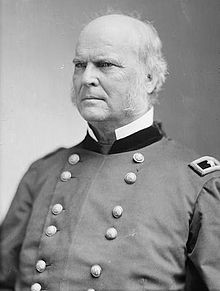Biographical Details
Date of Birth: December 12, 1814
Birth Location: Hanover, IN, USA
Graduation Year(s): 1832
Degree(s) Earned: Bachelors
Date of Death: July 24, 1887
Death Location: Dunn Loring, VA, USA

Date of Birth: December 12, 1814
Birth Location: Hanover, IN, USA
Graduation Year(s): 1832
Degree(s) Earned: Bachelors
Date of Death: July 24, 1887
Death Location: Dunn Loring, VA, USA
William McKee Dunn was born in the Indiana Territory. He was educated in the common schools of Jefferson and Montgomery Counties in Indiana. He followed his older brother, James Wilson Dunn, to the Indiana State Seminary (what would become IU) at age eleven. Brother James received his bachelor’s degree and was a member of IU’s first graduating class in 1830.
When the college was first organized into classes, as Dunn recalled later, “I constituted the Sophomore Class, and for an entire session I had a bench all to myself at college prayers, by virtue of my being all the Sophomores.” He received his bachelor’s degree (from what had now been renamed Indiana College) at age seventeen. Three years later, he received a master’s degree from Yale. Shortly after that, he received a master’s degree (and later in life a Doctor of Laws degree) from Hanover College in Indiana. He then became professor of mathematics at Hanover College.
During this time, Dunn also served for a year as a member of the Indiana House of Representatives. He studied law and was admitted to the bar in 1839 in Lexington, Kentucky. He practiced law, returning briefly to politics from 1850 to 1851 as a member of the State Constitutional Convention. He was a member of the Board of Trusteesat both Indiana University and Hanover College and devoted much of his time to the public schools in Madison, Indiana.
In 1859, Dunn went to Washington, DC, as the U.S. Congressional Representative from Indiana’s 3rd district. He served in this capacityuntil 1863. This was a major turning point in his career. For the rest of his life, he would reside in or near the nation’s capital and play a significant role in national affairs. He served as chairman of the Committee on Patents.
When the Civil War broke out, Dunn enlisted at age forty-six in the Union Army. For two years, he served as an aide on General McClellan’s staff in West Virginia. In 1863, he was promoted to major and was commissioned the judge advocate of Union Volunteers for the state of Missouri. In 1864, he was promoted to colonel and became assistant judge advocate for the entire U.S. Army. In March 1866, he was promoted to brigadier general for his faithful, meritorious, and distinguished service.
In 1868, Dunn was elected to the Indiana State House of Representatives. From 1875 to 1882, he served asjudge advocate general of the U.S. Army. In 1886, he was a delegate to the Philadelphia Loyalists’ Convention. He remained in exceptional health for most of his life. W. P. Hendricks wrote of his law career that he “was enabled to bar up till very near the end in full vigor of both mind and body.”
In 1841, Dunn married Elizabeth Lanier. They had 7 children together.
In April 1865, Dunn had a front-row seat to American history as he participated in the end of the Civil War. He was one of the two riders entrusted with carrying Ulysses Grant’s reply to Robert E. Lee’s offer to discuss surrender. He was also one of four riders who accompanied Lee back to confer with Grant.
Dunn’s first cousin (his father’s brother’s son), George Grundy Dunn, is the man for whom Dunn Meadow, Dunn Woods, Dunn Street, and Dunn Cemetery are named on the Bloomington campus of IU.